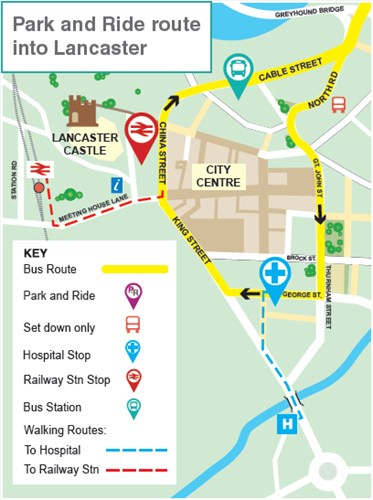Lancaster's park and ride service, which began in 2016, has always been hampered by two major flaws: the lack of any bus priority on Caton Road from the car park site to the city and cheeseparing by the County Council that has restricted the service to one-bus operation, meaning only a half-hourly frequency can be offered. On the plus side, the inability of the same council to provide ticket machines at the car park means that the planned parking charge has never been imposed, leaving users with only the modest bus fare of £1.60 return to pay. (A passenger boarding a local bus outside the car park site would pay £3.70!)
Destinations served in the city are also limited, with pick-up and drop-off points restricted to George Street, China Street (promoted as "for the railway station" but in reality a 300m partly uphill walk away) and the bus station.

Any improvement to frequency or extension to the route would require at least a second vehicle, but it now appears that plans are afoot to bring this about - subject as always to funding being found.
The Royal Lancaster Infirmary, located to the south of the city and shown at the bottom of the map above has always had a problem with parking, both for staff and visitors. Planning permission has been granted for the construction of a new car park at the hospital, but the downside of this is that during construction the current number of parking spaces will be reduced.
As one of a number of mitigation measures agreed between the County Council and the Hospital Trust funding will be made available (by the Trust) to improve the Park and Ride - increasing the frequency and extending the route. The idea is to encourage hospital staff and visitors to leave their cars at the Park and Ride site and catch the newly-extended bus service to the hospital.
The new route is shown in a surprisingly-amateurish plan contained within the Planning Agreement that gives the go-ahead to the car park and shown below:
Park and Ride buses will run directly from Caton Road to the Infirmary, before turning at the Pointer roundabout and returning to the Park and Ride site via Queen Square, China Street and the bus station. The map refers to a stop on King Street, but this would appear to be an error.
Provision of a second vehicle is intended to allow the frequency to be improved to every 20 minutes during peak hours and every 15 in the off-peak, this disparity reflecting the lack of bus priority and apparent acceptance that car traffic will continue to disrupt the service when it is needed most.
Whilst the Bus Users' Group welcomes the frequency improvements it is concerned that the service may become too skewed in favour of the hospital above other users. Passengers for the city centre will have no option but to travel through the city to the Pointer without the option to alight and the remaining city centre stops at Queen Square and China Street will involve crossing the one-way system to access the shops. At least a contribution of £10,000 will be made to enhance the Queen Square stop with a shelter (it already has a raised kerb).
The Hospital Trust is required to start paying for the improved service as soon as it starts work on the car park and will continue to make the contributions for a further three years after completion. There is, as yet, no firm date for the introduction of the new route and timetable as the Trust have to ensure that they have funding for the car park works in place, although the BUG understands that staff have been informed that construction will start in the New Year.






